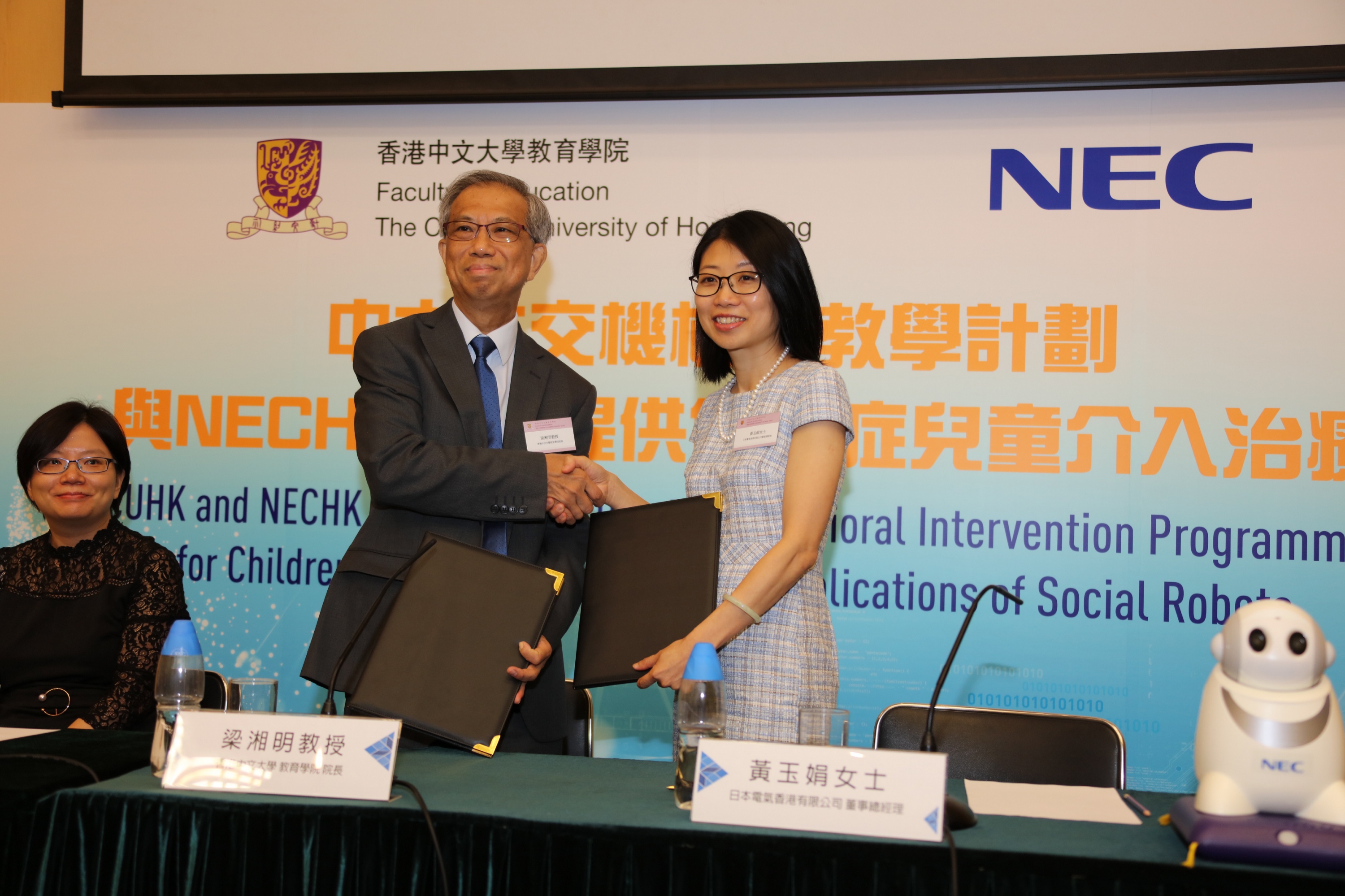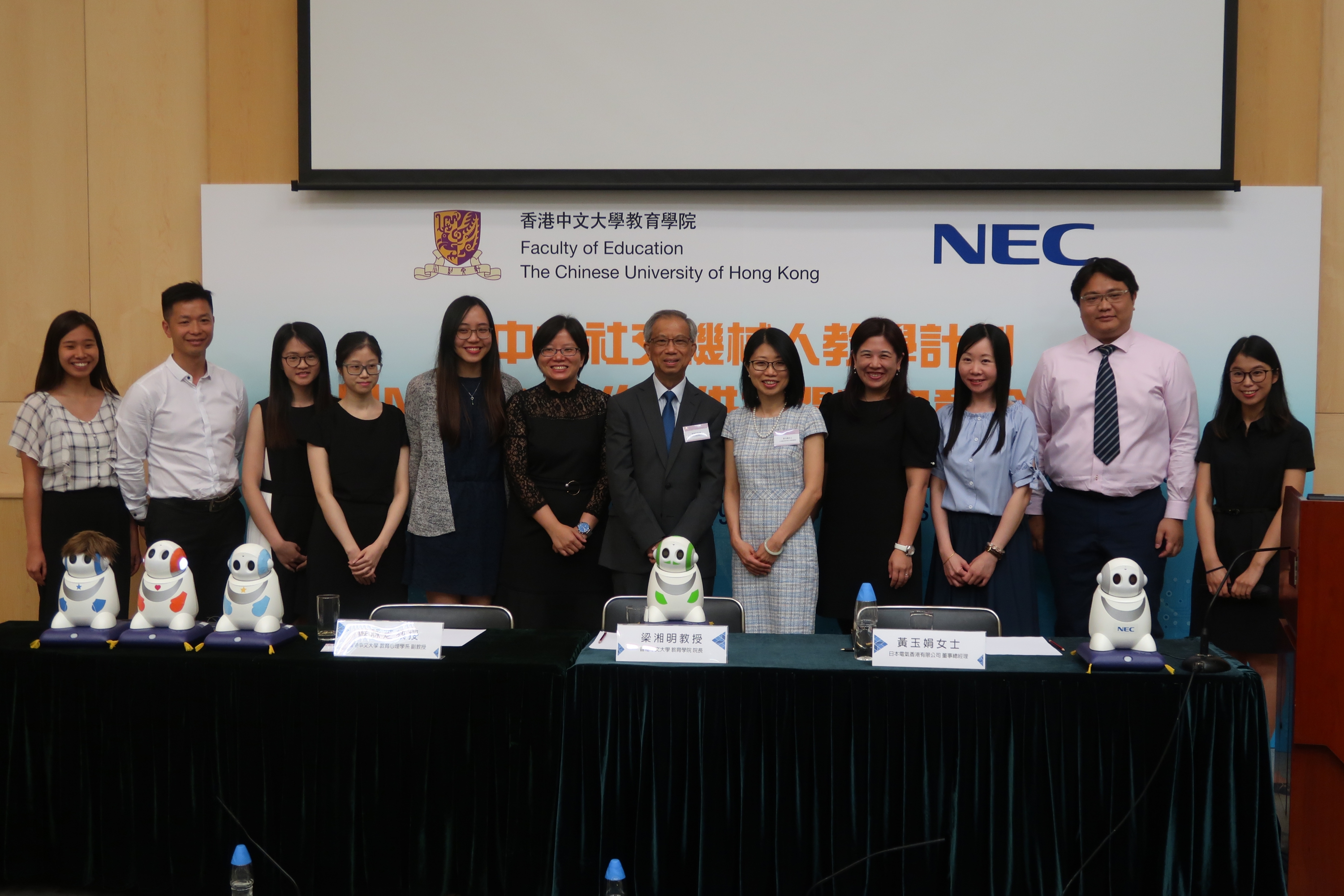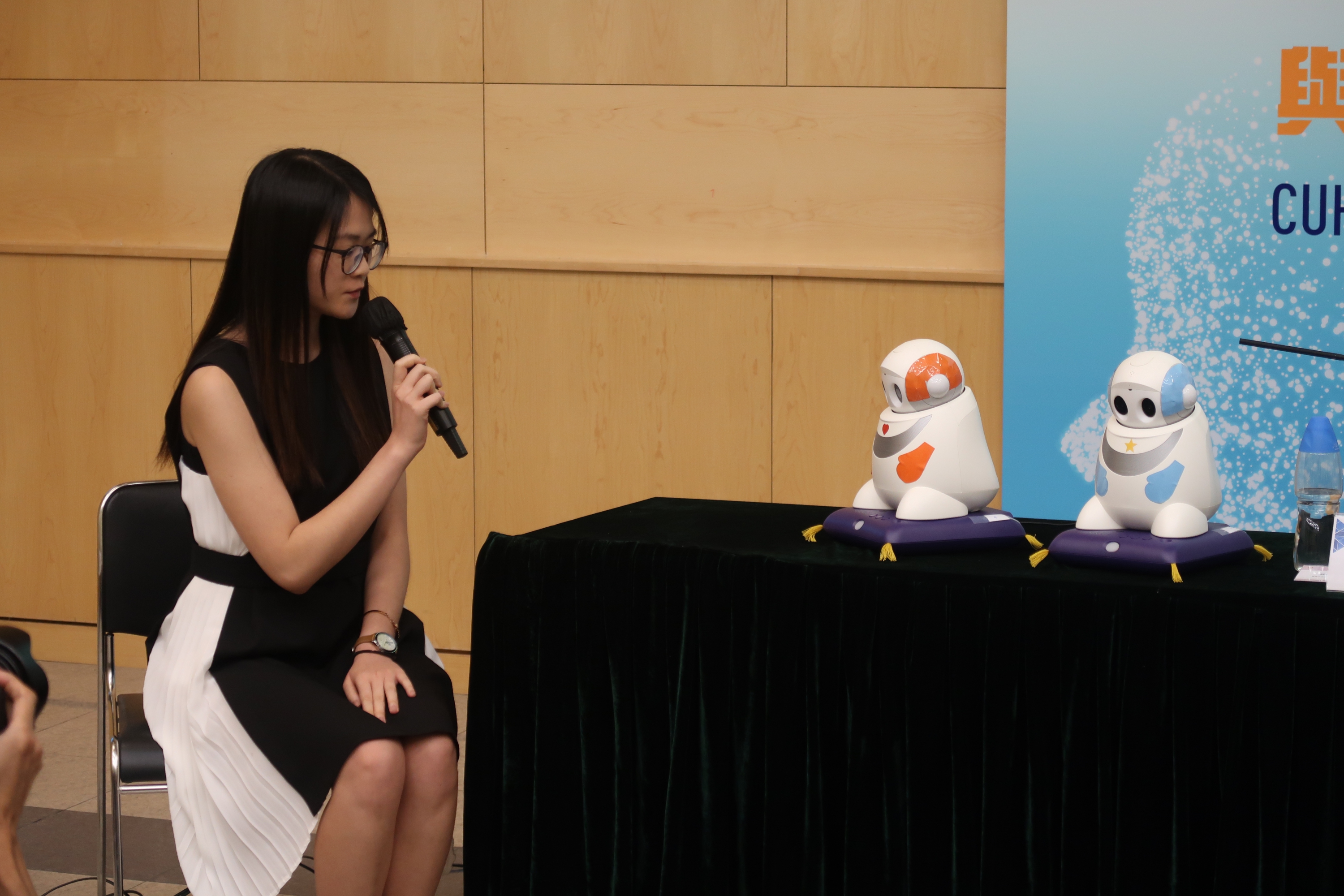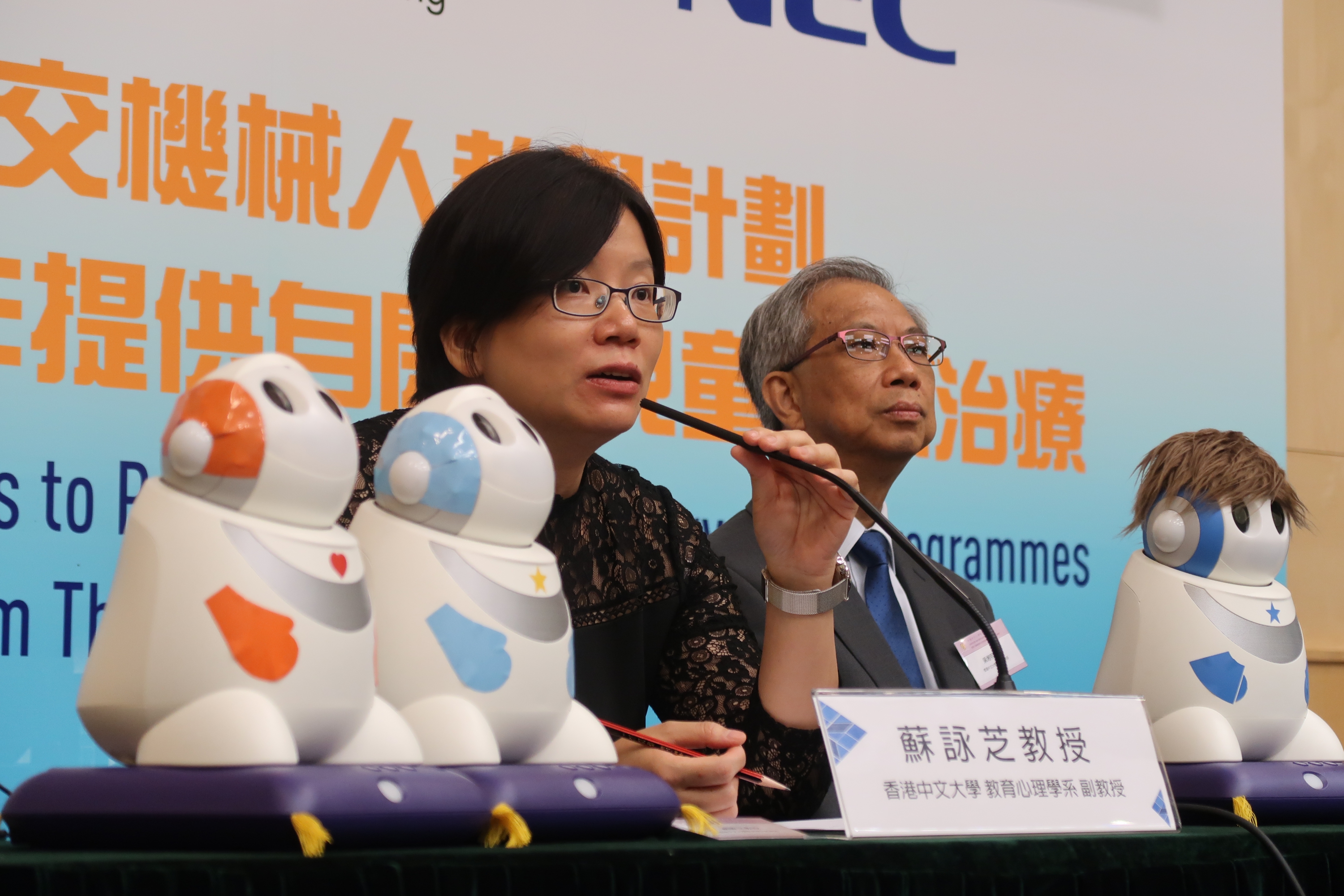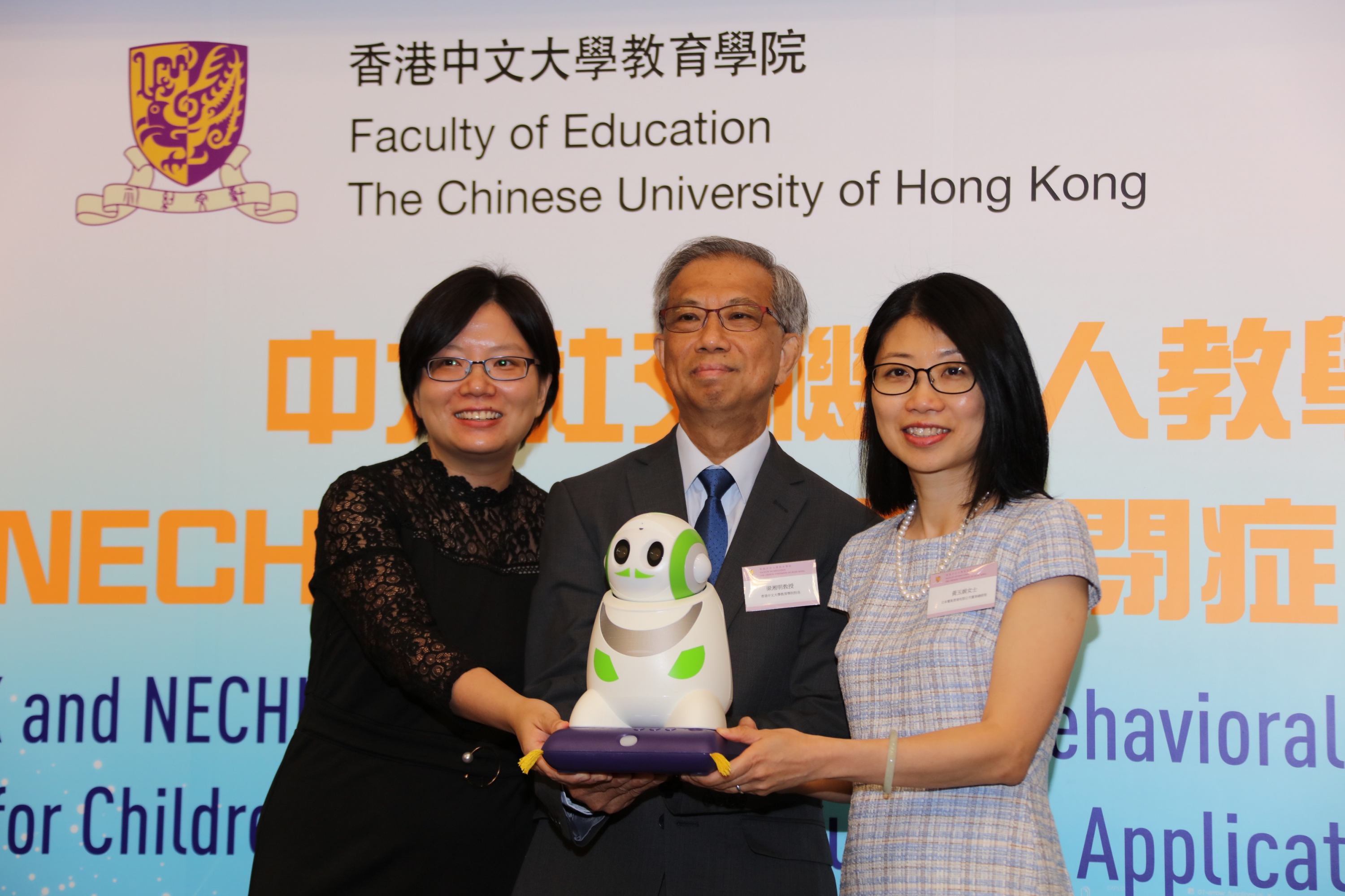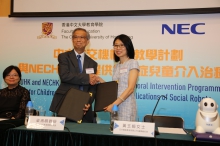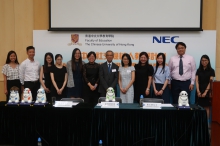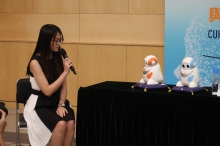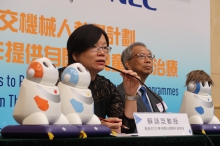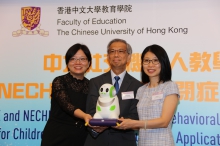CUHK
News Centre
CUHK and NECHK Join Hands to Provide Behavioral Intervention Programmes for Children with Autism Through the Applications of Social Robots
The Chinese University of Hong Kong (CUHK) and NEC Hong Kong Ltd. (NECHK) today (28 May) join hands by signing a memorandum of understanding (MOU) to promote CUHK’s robot-based intervention programme for children with autism spectrum disorders (ASD) in Hong Kong. The interdisciplinary research team led by Prof. So Wing-Chee, Associate Professor from the Department of Educational Psychology at CUHK, has designed a new series of training programmes which are tailored to meet the diverse learning needs and verbal abilities of autistic children. These programmes will be deployed with NECHK’s latest social robot “HUMANE” to provide language communication, self-care and behavioural training. To benefit more autistic children, these programmes will be offered to special schools and non-profit organisations. Prof. So’s team will also provide free training services at CUHK during the summer.
Prof. Alvin Leung Seung Ming, Dean of Education of CUHK, said, “The Faculty of Education is passionate about improving education for our children, and is committed to serving and leading the education community through teaching and instruction, innovative research endeavors, and timely development and service projects. The robot-based intervention programmes designed and implemented by Prof So’s team have made them pioneers in incorporating technology into special needs education in the university and education settings. The big data collected from these programmes can guide researchers interested in autism and other special needs to delve into the individual variations in verbal and nonverbal behaviours of these atypically-developing children, thereby generating more effective intervention programmes. This service, with its effectiveness supported by empirical evidence, proves that our Faculty can successfully transfer knowledge to the community and, even more promising, make a significant and positive impact on society in Hong Kong, and around the world. The Faculty of Education is looking forward to collaborating with NECHK and increasing the well-being of children in need.”
Proven success in using social robots to promote gestural communication
According to the Mental Health Review Report, there were about 2,000 new cases of children diagnosed with ASD in 2016 and a rising trend has been seen. These children are characterised by impairments in communication and social interaction and behavioral malfunctioning. In addition, they have sensory issues and often produce certain maladaptive responses, which are termed “challenging behaviours”. Such behaviours worsen with age emphasises the need for early intervention.
Prof. So’s team launched a robot-based gesture intervention programme in 2015. The team deployed social robots to imitate human actions in training children with ASD gestural communication skills. The team has reached out to preschool children with ASD from different non-profit organisations and provided them with robot-based intervention free of charge, and this is supported by CUHK and the government. More than 350 preschool and school-aged children with ASD have participated in this programme. In Prof So’s most recent work published in Molecular Autism, the findings have shown that children with ASD who received robot intervention were more likely to produce verbal markers while gesturing than those in the wait-list control. They could even catch up to the level of gestural production found in children with typical development. These findings have extended the previous research, which has posited that robot-based gestural training can be considered as an effective early intervention for gestural communication. The robot-based training may even help children whose language and motor skills are delayed.
Future advancement in robot-based intervention
Following on the success of the robot-based gesture intervention programme, Prof. So’s team took a big leap forward and started a new programme named “Robot for Autism Behavioral Intervention” (RABI). They have designed dramas and role plays training that tailored for 3- to 7-year-old autistic children who have diverse learning needs and verbal abilities.
Those who have stronger verbal abilities will be taught emotional understanding and appropriate behaviours in specified scenarios, such as a ride on a bus, studying in a classroom or seeing a doctor, through robot drama demonstrations. For example, a robot acting a child with ASD loses temper and yells at its sibling due to the sudden change of the schedule. Then the parent robots explain the change and teach the child robot how to express the anger or anxiety appropriately; those who have moderate verbal abilities will be taught conversation skills through role play with a robot, to practise communication and social skills, such as eye contact. The robot will then provide immediate feedback on a good or bad performance; those with weak verbal abilities will be taught simple communication acts and self-care. The team will first understand children’s interests and programme the robot to motivate the child to request the objects they like. The team will launch these programmes this summer at CUHK, each last for 3 to 4 weeks without any charges. Over a hundred parents have signed up for the programmes for their children. (https://www.rabimassage.com/rabi)
The new social robot “HUMANE”, developed by NECHK, is the key to RABI. Controllers can use a computer to carry out all preset training programmes. It is user-friendly and children can be trained at any time and locations, which is suitable for schools and non-profit organisations.
Ms. Elsa Wong, Managing Director of NECHK, said, “NECHK Social Robot ‘HUMANE’ was developed specifically for human interaction. NECHK has developed not only the non-judgmental and cute robot, but also a friendly and smooth communication robot for children and the elderly, which can communicate interactively in Cantonese with human-like expression, including facial expression. In order to provide personalised services, ‘HUMANE’ is designed to use its cameras, microphones and sensors to record the child’s facial expressions and body language as they interact. Then, the range of data that is collected by cloud-based applications can be analysed and indicate the most effective way to gain the child’s attention for further communication and teaching. By connecting ‘HUMANE’ to the cloud by its Wi-Fi network function, it is possible to use cloud-based applications tailored to a wide range of purposes and goals, such as caregiving and education. ‘HUMANE’ is not only an effective teaching tool, but it can also be the child’s best friend for developing communication and social skills.”
About The Chinese University of Hong Kong
Founded in 1963, CUHK is a leading comprehensive research university with a global reputation. Located in the heart of Asia, CUHK has a vision and a mission to combine tradition with modernity, and to bring together China and the West. Under the University’s unique collegiate system, the programmes and activities offered by its nine colleges complement the formal curricula by delivering whole-person education and pastoral care. The University has eight faculties: Arts, Business Administration, Education, Engineering, Law, Medicine, Science, and Social Science. Together with the Graduate School, the University offers over 300 undergraduate and postgraduate programmes. All faculties are actively engaged in research in a wide range of disciplines, with an array of research institutes and research centres specialising in interdisciplinary research of the highest quality.
CUHK is recognised as the most innovative university in Hong Kong and ranks 27th in the Asia-Pacific region by the latest ‘Reuters: Asia Pacific’s Most Innovative Universities’ listing. The University currently has more than 800 granted patents in different jurisdictions worldwide. Some of these patents have been licensed to relevant industries that help bring these innovations to the market to benefit society. In academic year 2016-17, CUHK has received 132 granted patents and filed 223 patent applications for inventions developed in the areas of medical technology, biotechnology, information technology, telecommunications, and materials science.
Prof. Alvin Leung Seung Ming (middle), Dean of Education at CUHK, and Ms. Elsa Wong (right), Managing Director of NECHK sign a MOU on robot for autism behavioural programme.
The team leads by Prof. So Wing-Chee (from 1st to 6th left) will provide free Robot for Autism Behavioural Intervention training to autistic children.
The new social robot “HUMANE”, developed by NECHK, can communicate interactively in Cantonese and facial expression. Equipped with sensors, it can record and analyse the child’s speech and body language and give instant feedback to improve their social skills.
The team leads by Prof. So Wing-Chee, Associate Professor from the Department of Educational Psychology at CUHK, with integration of technology and behavioural therapy, has designed a series of social and self-care training programmes. These programmes are tailored to meet the diverse verbal abilities of autistic children to improve the effect of treatments.


